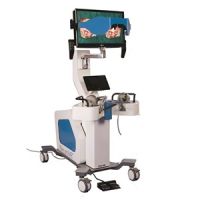Philips and the Charité – Universitätsmedizin Berlin start joint research program on non-pharmacological methods to prevent delirium in critical care
Clinical insights combined with innovative non-pharmacological delirium management solutions may help prevent or lessen delirium and help critical care patients recover faster
Royal Philips (NYSE: PHG; AEX: PHIA) announced a five-year research collaboration with the Charité – Universitätsmedizin Berlin, Germany, to explore non-pharmacological solutions with a special focus on preventing or reducing the impact of delirium, aiming to transform the patient environment and improve patient outcomes in critical care. Philips and Charité will investigate how new lighting and acoustics concepts, as well as human interaction within intensive care units (ICUs) can have a positive impact on cognitive and mental recovery of patients in critical care.
Critical care units such as ICUs are high-tech units to care for patients with severe and potentially life threatening conditions that require constant and close monitoring. However, these units are also associated with a busy, noisy, tech-oriented environment. Research has shown that high noise levels and inadequate lighting are common in ICUs and may increase the risk for transitioning to delirium. Delirium is the most common brain dysfunction in the ICU and occurs in 30 to 80 percent of patients [1]. ICU delirium is associated with long-term cognitive impairment [2] and is estimated to cost USD 145 billion annually in the United States alone [3].
Non-pharmacological factors such as enhanced lighting, noise reduction that support the circadian rhythm and patient sleep are thought to have a beneficial impact on delirium. The research collaboration between Philips and Charité will investigate a comprehensive set of delirium management concepts, including circadian-effective lighting to restore circadian rhythm. Specifically, the partnership seeks to:
Non-pharmacological factors such as enhanced lighting, noise reduction that support the circadian rhythm and patient sleep are thought to have a beneficial impact on delirium. The research collaboration between Philips and Charité will investigate a comprehensive set of delirium management concepts, including circadian-effective lighting to restore circadian rhythm. Specifically, the partnership seeks to:
• Acquire deep knowledge and insights to prevent delirium by non-pharmacological means;
• Develop solutions for transforming the patient environment in critical care and preventing or lessening delirium and its harmful effects;
References:
[1] Wenham T. et al., Contin Educ Anaesth Crit Care Pain, 2009, 9(6):178-183
[2] Pandharipande P.P. et al., N Engl J Med, 2013, 369(14):1306-16
[3] Leslie D.L. et al., Arch Intern Med, 2008, 168(1):27-32
[4]http://www.stifterverband.info/ueber_den_stifterverband/english/index.html
[5] Luetz A. et al., Crit Care Med, 2010, 38(2):409-18
[6] Ihrig A. et al., Anaesthesist, 2011; 60(8):735-9
[7] Van Eijk M.M. et al., Crit Care Med, 2009, 37(6):1881-5
[8] Ouimet S. et al., Intensive Care Med, 2007, 33(1):66-73
[9] Pearse R.M. et al., Lancet, 2012, 380(9847):1059-65
• Create enhanced ICU workflows as well as patient-relative and staff interaction protocols to better support cognitive and mental recovery of critical care patients;
• Increase delirium awareness throughout the global health care community and move the critical care transformation forward.
• Increase delirium awareness throughout the global health care community and move the critical care transformation forward.
“Charité is one of the largest university hospitals in Europe and a globally respected, visionary organization working on the frontline of the critical care innovation,” said Carla Kriwet, CEO Philips Patient Care and Monitoring Solutions (PCMS). “With the launch of this deep, multi-year collaboration, we’re able to collaborate with this great organization while continuing to build on our clinical and technology expertise and develop innovative, non-pharmacological solutions for critical care environments with the potential to make a difference for millions of lives.”
In addition, Philips endows a professorship at Charité, which will be set up by the non-profit, Stifterverband [4]. “The new professorship will advance ground-breaking research into how the ICU environment impacts patients and how improvements to that environment and to patient-relative and staff interactions can prevent or ameliorate delirium,” said Professor Claudia Spies, Head of the Department of Anaesthesiology and Intensive Care Medicine at Charité Berlin. “Having a research-oriented industry partner like Philips gives us the opportunity to translate discoveries into solutions more quickly for the benefit of patients and for the effort to better allocate health care resources.”
Delirium can increase length of stay in hospitals by five to 10 days [5], cause secondary illness or injury and put additional mental/physical stress on patients [6]. Although there is increasing awareness of delirium, it is commonly undetected and options for treatment are limited [7]. Delirium dramatically impacts both patient outcomes and hospital costs. It doubles ICU mortality and triples six-month mortality [8], and may contribute to inefficient ICU resource allocations [9].
Philips is a leader in critical care and offers a comprehensive portfolio of therapeutic care solutions, as well as patient monitoring solutions ranging from bedside monitors to wearable patient monitors, combined with clinical decision support tools and mobile applications to provide immediate access to actionable information.
References:
[1] Wenham T. et al., Contin Educ Anaesth Crit Care Pain, 2009, 9(6):178-183
[2] Pandharipande P.P. et al., N Engl J Med, 2013, 369(14):1306-16
[3] Leslie D.L. et al., Arch Intern Med, 2008, 168(1):27-32
[4]http://www.stifterverband.info/ueber_den_stifterverband/english/index.html
[5] Luetz A. et al., Crit Care Med, 2010, 38(2):409-18
[6] Ihrig A. et al., Anaesthesist, 2011; 60(8):735-9
[7] Van Eijk M.M. et al., Crit Care Med, 2009, 37(6):1881-5
[8] Ouimet S. et al., Intensive Care Med, 2007, 33(1):66-73
[9] Pearse R.M. et al., Lancet, 2012, 380(9847):1059-65
Source & Image Credit : Philips
Latest Articles
Royal Philips, ICU, Critical Care, Delirium, Monitoring Systems
Clinical insights combined with innovative non-pharmacological delirium management solutions may help prevent or lessen delirium and help critical care patients recover faster. Royal Philips (NYSE: PHG; AEX: PHIA) announced a five-year research collaborat



























